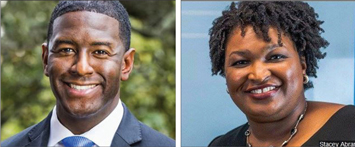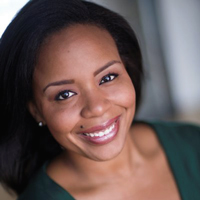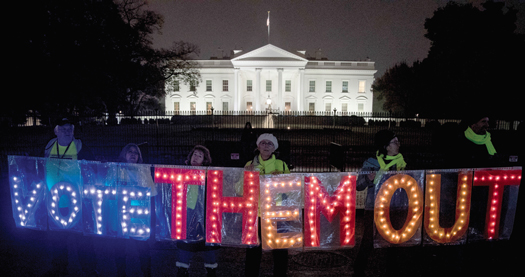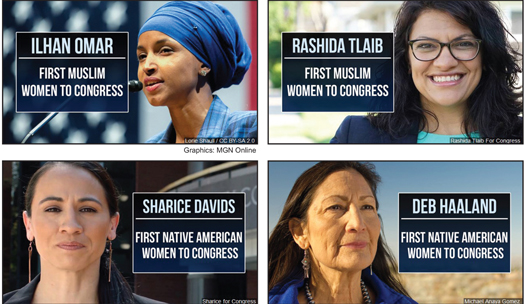The aftermath America’s midterm mayhem and mess
By Barrington M. Salmon -Contributing Writer- | Last updated: Nov 14, 2018 - 9:01:12 AMWhat's your opinion on this article?

Andrew Gillum Photos: MGN Online (r) Stacey Abrams
|
As she reflected on the results of the 2018 midterms, Ms. Watley—who worked with Black PAC and National PAC27 to mobilize Blacks across the country to vote—exulted in the significant gains and successes Black women and women of color enjoyed, the result of years of hard work.
“This was a win for Black women, women and people of color who picked up seats,” she told The Final Call. “They represent the millions of people whose voices are often unheard. They picked up national and local seats. Who thought the fact that Andrew Gillum and Stacey Abrams would be close to being in a runoff in states where they shouldn’t even be competitive or even?”

Michele L. Watley Photo: Twitter
|
In what is generally regarded as a pointed rebuke of President Donald Trump and the Republican Party’s stewardship of the United States over the past two years, the Democratic Party swept into power in the House of Representatives.
Democrats shattered the Republican monopoly on power in a nasty, bruising election battle, while marshaling a new generation of legislators intent on changing the tone, tenor and production of a hyper-partisan, deadlocked Congress.
The shift in Republican fortunes was fueled by a Black woman-led suburban revolt with voters supporting progressive candidates and political outsiders, sending more than 100 women—the most racially diverse group of people ever—to Congress. The 2019 class of Congress will have the first two Muslim women in the body, Rashida Tlaib and Ilhan Omar; and the first two Native Americans, Sharice Davids and Deb Haaland.
Dr. Melanie L. Campbell, convener of the Black Women’s Roundtable, said this election cycle success Democrats enjoyed has come because Black women have rewritten the political playbook of how to win at the local level. This success is rooted in the hard and tireless work of Black women. For more than a year, Black women were on the ground in Georgia laying the groundwork: canvassing neighborhoods, registering potential voters, focusing on voter protection and generally using the old-fashioned approach of knocking on doors, engaging people and letting them know that they’re important.
Political analyst Dr. Avis Jones-De- Weever said, the Democrats will provide oversight, serve as a crucial check and balance and use the ability to launch investigations, including into suspected corruption, the administration’s breach of protocol of security clearances, potential violations of the Emoluments Clause, Trump’s ties to Russia and whether the president and members of his inner circle colluded to steal the 2016 presidential election. She said she hopes Democrats make President Trump’s life miserable.

A group of people hold up a sign that reads “Vote Them Out” as they protest in front of the White House the night before midterm election voting Nov. 5, in Washington, D.C. Photo: AP Wide World Photos
|
“Probably the biggest benefit will be is that they’ll be able to investigate the actions of the president and his cabinet,” said Dr. Jones-DeWeever, author of the award-winning book, ‘How Exceptional Black Women Lead.’ “I want Maxine (Waters) to be getting those tax returns, investigate the money laundering and the high crimes, and his connections to Russia. I’m so happy that Rep. Elijah Cummings will be the adult in the room (as chairman of the House Oversight and Government Reform Committee). Democrats will really be in a position to protect Robert Mueller,” she said.
“The turnout of African Americans was outstanding,” said Dr. Shiela Harmon-Martin, a political scientist who is a division chair at the University of the District of Columbia. “There were eight million votes cast in Florida. African Americans were clearly energized—women and young people—and provided a critical vote. There was incredible engagement. I think this is truly the launch of 2020.”
Passage of two ballot initiatives represent big wins for Blacks, she said. In Louisiana, the initiative that requires a unanimous jury to convict a person of a felony passed with 64.5 percent support from voters.
“This is very important in a state like Louisiana where there are lots of African Americans and poor Whites who are sent to Angola (State Prison),” Dr. Harmon-Martin explained. “And of course, in Florida, Amendment 4 will restore the voting rights of those released from prison. That is nine percent of the state’s population and 18 percent of African Americans. To me these are huge wins.”
Voters also threw their support behind progressive initiatives on the ballot that will expand Medicaid and measures to have independent bodies draw Congressional districts to blunt the massive gerrymandering in which Republicans have engaged.
Record voter turnout
Americans across the country had to contend with broken and malfunctioning voting machines; technical glitches; inordinately long lines; power outages; harassment and intimidation of Black voters from poll workers; polling stations opening late; people were purged from the voter rolls; one polling site in Florida being moved into a gated community; machines in Texas switching votes; and a rash of other problems. In Texas and Georgia, judges ended up extending voting hours to accommodate the crush of voters and to allow everyone in line to cast a vote.
Yet, all these problems didn’t stop a record number of voters to turn out in these midterms.
This election shattered all types of records. More than 30 million people cast their vote. As many as 110 women, many of them for the first time, will join the lower chamber of Congress in January. This class has the most women of color and the most first-timers.
Millennials of all races voted in numbers significantly higher than in 2014 with several states seeing triple-digit increases in voting.
Key governors’ races remain unresolved
Andrew Gillum and Stacey Abrams, who are seeking to become governors of Florida and Georgia, respectively, are locked in hotly contested races. Both are Democrats and are currently in situations where the races are so close that they have triggered automatic recounts. That has infuriated Florida Gov. Rick Scott, who is accusing Democrats of trying to steal the gubernatoral and senatorial elections.
Mr. Gillum—mayor of Tallahassee—had conceded following Nov. 6 results which appeared to give challenger Ron DeSantis victory, but the race has tightened considerably.
At presstime, unofficial results showed Mr. DeSantis led Mr. Andrew Gillum by 0.41 percentage points in the election. In the Senate race, Mr. Scott’s lead over Democratic incumbent Bill Nelson was 0.14 percentage points.

|
State law requires a machine recount in races where the margin is less than 0.5 percentage points. Once completed, if the differences in any of the races are 0.25 percentage points or below, a hand recount will be ordered.
Elections officials in Broward County, where Democrats have a distinct advantage, were still reviewing ballots on Nov. 8. Days prior, Broward County Elections Supervisor Brenda Snipes, told reporters she didn’t know the number of ballots still to be counted, but promised that all of them were being processed. There is also an undetermined amount of mismarked, military and provisional ballots to be counted.
As votes were counted, President Trump, Gov. Scott, Sen. Marco Rubio and other Republican officials and political operatives squawked about election fraud in Palm Beach and Broward, both Democratic strongholds, and called for the counts to be halted. Tension was high as people for and against the recounts protested in parts of the state.
Meanwhile, in Georgia, Ms. Abrams vowed to make sure “every vote is counted.” Her team said tens of thousands of absentee and provisional ballots could mean her opponent, Brian Kemp would not reach the required 50 percent threshold to claim victory outright.
“Democracy only works when we work for it. When we fight for it. When we demand it,” Ms. Abrams said. “And apparently, today, when we stand in lines for hours to meet it at the ballot box.”
Voter suppression and voter manipulation at work
The Abrams-Kemp race pits a Trump conservative against a progressive Democrat in a campaign that exposed attempts by Mr. Kemp to tilt the election in his favor. As Georgia’s Secretary of State, he has disenfranchised significant swathes of Blacks, Asians, and Latinos by purging more than 1.5 million voters—almost 11 percent of those registered—from the rolls between 2016 and 2018.
He also closed 214 polling stations, the majority of them in poor and non-White neighborhoods. And using a program called “exact match,” he blocked almost 35,000 Georgia residents from registering from 2013 to 2016. Exact match only grants residents the right to vote if their registrations exactly match information found in state data bases. Registrations aren’t accepted if there is a name difference, a misspelled word or an accent.
The Georgia gubernatorial race is seen as the epicenter of voter suppression and voter manipulation, as Mr. Kemp has used a toolbox of dirty tricks in an attempt to derail Ms. Abrams campaign. Mother Jones’ Ari Berman said Mr. Kemp, who had been overseeing his governor’s race as secretary of state, accused Ms. Abrams, of trying to “steal this election” after Abrams called for all provisional ballots to be counted before Kemp declared victory. At presstime Mr. Kemp lead Ms. Abrams by 59,000 votes.
Prof. Carol Anderson, who teaches African American Studies at Emory University, said: “the narrative is the same as ever. Abrams didn’t have to fight just an electoral campaign; she had to fight a civil-rights campaign against the forces of voter suppression.”
Journalist and talk show host Jamila Bey agreed. “They set up polling places without power cords? They are disenfranchising Black people,” she said. “The idea that they think it’s okay to cheat Black folks and poor people out of their vote is reprehensible. This is the last gasp of White supremacy but there’s still enough air in their lungs to be dangerous.”
“The evidence doesn’t bear out the reality that things have changed. Black folks are 13 percent of this country’s population and women are 51 percent. Trying to eliminate racism through the ballot box is impossible. Black folks need to do more identity politics, be more inclined to split votes with non-white supremacists. We have to keep ultimate pressure on politicians and keep a focus locally because all politics is local.”
Veteran labor organizer Bill Fletcher said as America experiences a seismic demographic shift and becomes browner, the fear of a Black and Brown planet and trepidation about the loss of power is fueling desperate efforts to thwart Black advancement, their access to the vote and political, social and economic power.
“When you think about what Trump said during the election, he’s demonstrated how much there is to lose,” he said. “Affirmative action, denaturalization—who are they gonna be coming after? Africans, Caribbeans, Asians and anyone who raises hell. We have a lot to fear and lot to lose.
“Fear of demographic changes is driving this agenda and what Trump is doing is a combination of things. There is a growing crisis within the settler state of the U.S., brought on by a convergence of economic, environmental and demographic factors. This is also a White nationalist revolt against everything we won in the ‘60s.”
Mr. Fletcher argues that the political right has made race central to their organizing approach and message, and Republicans look at Trump “as a blunt force object, an effective mechanism to move their long-term agenda.”
Journalist and commentator Jamila Bey agreed. “We’re in Reconstruction all over again,” she said. “This is a cold civil war. I do believe more is coming. We’re leading up to something bigger. Acts of terrorism will continue because they want us to know that they feel put upon and are unwilling to share power.”
Ms. Watley pointed out that voting is just the first step. “It’s after the vote that is important,” she said. “Voting is just the start. Black people need to vote for candidates who support their issues, be more issue-oriented, build institutions and power and hold the people they elect accountable. Racism transcends party which is why African Americans can’t be party-oriented.”
What people are not hearing is how voting for a candidate will change their current situation, she explained. “Black people know that people died for the right to vote but Black people are still getting shot in the streets. People are taking care of their children, working, are busy and tired,” said Ms. Watley.
“Representatives are not doing a good job. They clearly aren’t communicating how voting will help them. There’s a disconnect. We had a minimum wage initiative and it passed because people are getting more money. People want to make $15 an hour. A medical marijuana initiative also passed because people like weed and want access to it and those who need it for medical reasons also want access to it. This shows that people are willing to take action when it benefits them.” (Associated Press contributed to this report.)
INSIDE STORIES AND REVIEWS
-
-
About Harriett ... and the Negro Hollywood Road Show
By Rabiah Muhammad, Guest Columnist » Full Story -
Skepticism greets Jay-Z, NFL talk of inspiring change
By Bryan 18X Crawford and Richard B. Muhammad The Final Call Newspaper @TheFinalCall » Full Story -
The painful problem of Black girls and suicide
By Charlene Muhammad -National Correspondent- » Full Story -
Exploitation of Innocence - Report: Perceptions, policies hurting Black girls
By Charlene Muhammad -National Correspondent- » Full Story -
Big Ballin: Big ideas fuel a father’s Big Baller Brand and brash business sense
By Bryan Crawford -Contributing Writer- » Full Story






 Click Here Stay Connected!
Click Here Stay Connected!








